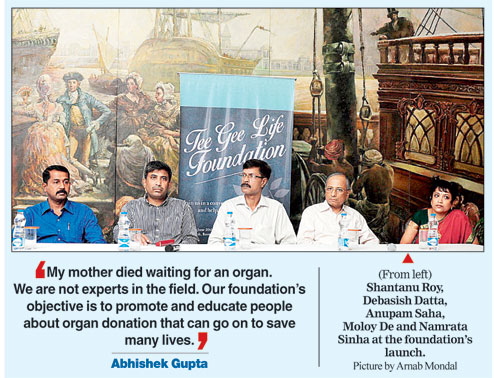
Abhishek Gupta's mother Tutul was suffering from cirrhosis and needed a liver transplant.
But by the time the family found a donor, it was too late. Tutul died in April 2014.
Tutul was one of the two million-odd people in the country who died for want of an organ donor over the past five years.
Abhishek and his family launched Tee Gee Life Foundation at Bengal Club on Saturday to spread awareness about organ donation and the legalities and risks involved.
"My mother died waiting for an organ. We are not experts in the field. Our foundation's objective is to promote and educate people about organ donation that can go on to save many lives," Abhishek said at the start of the event.
Living organ donation has been going on for years, especially for kidneys, but the huge demand for other organs can be met with an increase in cadaver donations, he said.
His father Biswadip said the money meant for his wife's treatment had led to the formation of the trust. It would mainly educate people who are wary of donating organs, he said. "We plan to spread the message through Facebook."
When can a person's organs be removed from his body? Which organs can be removed and donated? How long can an organ be preserved? What are the risks faced by a potential donor? What are the legalities involved? A panel of doctors and professionals present at the launch discussed these and more.
Dr Debasish Datta of Fortis Hospital, Calcutta, who had treated Tutul, his colleague from Gurgaon, Brigadier Dr Anupam Saha, principal health secretary Moloy De, sergeant Shantanu Roy, who has benefitted from liver transplant, and Namrata Sinha, a family friend of the Guptas and a chartered accountant who had flown down from the US to donate part of her liver to Tutul, were among the panellists.
Datta began the discussion talking about cirrhosis. "We cannot cure cirrhosis. We can only give them medicines to stall the decline. Of 100, just 10 will survive after three months of being diagnosed," he said.
Saha said organs could be removed from a brain-dead person. For a living organ donor there are some risks. "The donor has to undergo a major surgery... there is a small chance that he/she could die," Saha said.
He also explained how a healthy liver could be split to save two lives - an adult's and a child's - and the importance of having a donor's card.
Namrata Sinha spoke about "the joy of saving a life". "The 0.5 per cent potential risk against the joy of saving a life motivated me to offer part of my liver to Tutul aunty," she said. "I had spoken with my doctors in the US and was ready for the challenge. But it was too late...."
Roy, a resident of Bankura, said a liver transplant saved his life. "Today, I don't have major restrictions. I can lead a normal life."
Principal health secretary Moloy De dwelt on legal and regulatory issues involved in organ donation. "Our state sees a large number of kidney transplants," he said. "The organ repository and the pool of donors should be managed by the state. Private hospitals cannot do it. We are working towards better facilities and faster paperwork."











